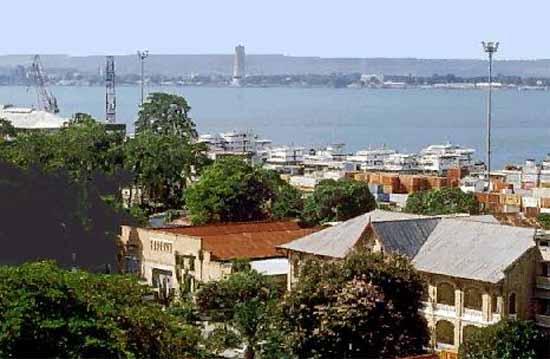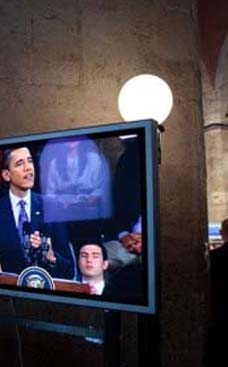
Over the next year, the drawdowns in Iraq will be roughly adequate to permit planned buildups in Afghanistan, After that, the nation's military leaders hope to give soldiers and Marines a bit more time at home between deployments. Defense Secretary Robert M. Gates, aware of the need to cap defense spending, is halting the buildup of the Army and Marine Corps once current targets are reached later this year. It is unlikely the U.S. ground forces will be in a position to consider even a modest role in a new mission until 2011. As such, direct American involvement on the ground in Congo seems implausible. Unfortunately, without such U.S. leadership, the world is unlikely to want to do more itself. Michael O'Hanlon, a Senior Fellow at the Brookings Institute and a Visiting Lecturer at Princeton University, served as a Peace Corps Volunteer in Congo Kinshasa.
Michael O'Hanlon writes: With all the attention given to Iraq, Afghanistan, Darfur and other hot spots around the world, one place consistently is forgotten - the Democratic Republic of Congo, formerly Mobutu Sese Seko's Zaire
JONES/O'HANLON: World's deadliest spot
Time for Obama to get creative
By Bruce Jones and Michael O'Hanlon | Wednesday, April 29, 2009
With all the attention given to Iraq, Afghanistan, Darfur and other hot spots around the world, one place consistently is forgotten - the Democratic Republic of Congo, formerly Mobutu Sese Seko's Zaire.
Yet the death toll from conflict in this single place has been the greatest in the world, by far, over the past decade. More than being a humanitarian tragedy, the war destabilizes a country rich in minerals, allows the establishment and spread of diseases such as Ebola (which probably came from Congo) and makes a mockery of Western values and American leadership as we sit and watch the ongoing strife.
We need not act only out of guilt or despair. The reason to step up efforts in Congo is not simply to do something to assuage guilty consciences. Africa in general is showing more hope these days, and Congo in particular faces an opportunity as well as a danger.
Although all of the country is underdeveloped and weakly governed, the greatest danger lies in eastern Congo. That lush region, home to mountain gorillas and rich volcanic soil and some of the most beautiful lake regions on the planet, faces a triple whammy: Congo's general state weakness, the ongoing presence of the Hutu genocidal extremists from Rwanda who fled their own country in 1994, and a competition for the area's rich resources by a number of militias (some possibly backed by Rwanda's Tutsi-led government in recent times).
There were some positive developments over the winter. Most notably, under outside pressure and much to the relief of the government in Congo, Rwanda arrested the region's chief warlord, Gen. Laurent Nkunda. Eastern Congo's other threats remain in place, however, and the only way to address them, while the Congolese military is gradually reformed and trained, is to beef up international peacekeeping capability.
The United Nations has called for precisely that, requesting 3,000 more foreign troops on top of the 17,000 already in the country. But war-weary nations in the West are ignoring the request, leaving it to Egypt, Bangladesh and Jordan to volunteer troops.
None of these nations, alas, has the requisite airlift to deploy the troops, so the mission is still understaffed. And at just this moment, a dispute between President Joseph Kabila of Congo and India's military command threatens to cause the departure of Indian troops from the U.N. mission, which would hobble the mission at a critical time.
The United Nations may respond by pulling all forces out of the rest of Congo to reinforce the East - which would make sense except that the rest of the country is hardly stable itself.
Congo is not Darfur. There are no complicated issues of how any deployment of Western troops would be seen by the Muslim world, and there is no serious claim that any such increase would reflect European neocolonialism in Africa. Indeed, a common complaint today is that European troops participate in peacekeeping in the Middle East but not Africa.
To add 3,000 more troops would not establish a trusteeship for Congo; it would rather help Congo extend its own sovereignty over a part of the country it cannot yet control on its own. In short, there is no serious geostrategic case against beefing up the mission.
There are, alas, practical impediments. The world community is trying to strengthen its presence in Afghanistan; it also is diplomatically preoccupied with various challenges from Russia to Pakistan, North Korea to Iran. Also, the United States military is seriously overworked, still maintaining 14 brigades in Iraq and four in Afghanistan.
Over the next year, the drawdowns in Iraq will be roughly adequate to permit planned buildups in Afghanistan, After that, the nation's military leaders hope to give soldiers and Marines a bit more time at home between deployments. Defense Secretary Robert M. Gates, aware of the need to cap defense spending, is halting the buildup of the Army and Marine Corps once current targets are reached later this year. It is unlikely the U.S. ground forces will be in a position to consider even a modest role in a new mission until 2011.
As such, direct American involvement on the ground in Congo seems implausible. Unfortunately, without such U.S. leadership, the world is unlikely to want to do more itself.
What are our options? It is time for the Obama administration and military leaders at the Pentagon to get creative. Some initial steps have been taken already, offering the mission U.S. military officers for the east. We could offer some airlift and related indirect support to Congo - although U.S. airlift is busy in Iraq and Afghanistan, the new Africa Command already has airlifted Rwandan troops into Sudan, and further such support may be possible.
We also should lobby Europe. Our allies have for the most part politely declined President Obama's recent request, on his European trip, to send more troops to Afghanistan. Countries such as Spain that have pulled out altogether could step up in Congo instead if that suits their national politics better. Spain earlier provided a force commander to the Congo mission, who resigned over the lack of suitable capacities at his disposal; a better approach would be for Spain to provide those capacities and reclaim a command role.
Not just our hearts but also our strategic interests require attention to Congo. For the Obama administration, moreover, this is an opportunity to stabilize the heart of Africa at a moment of great promise and to show the world it really is interested in a new brand of American global leadership. There are risks to such a mission, to be sure, but they are modest relative to the potential for great progress.
Bruce Jones and Michael O'Hanlon are senior fellows at the Brookings Institution. Mr. Jones is also a senior fellow at New York University and co-author of "Power and Responsibility." Mr. O'Hanlon is a former Peace Corps volunteer to Zaire/Congo.











